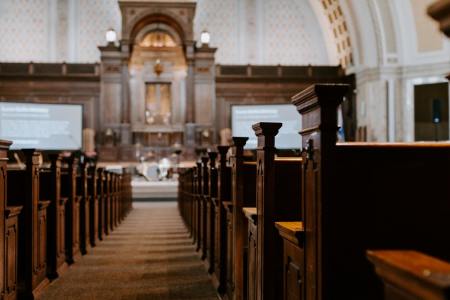Catholic, Lutheran churches to defy Minn. gathering ban by resuming services

The Minnesota Catholic Conference and the Lutheran Church—Missouri Synod of Minnesota have publicly declared that they will resume in-person worship services on May 26 despite state restrictions on religious gatherings.
In separate letters sent to Gov. Tim Walz, the ecclesiastical bodies said they will defy a reopening order limiting in-person worship to more than 10 people.
The church bodies plan to follow social distancing guidelines and have a limited capacity for their sanctuaries since they closed them earlier in response to the coronavirus pandemic.
The letter from leaders of Minnesota's north and south districts of the conservative Lutheran denomination explained that they sent correspondence to churches statewide this week telling them that they can reopen next Tuesday and hold their first in-person Sunday worship services on May 31.
The denomination had previously sent the governor’s office protocols that were developed following state and federal social distancing guidelines in hopes that the state would include churches in its reopening plan for businesses and other entities.
“We were disappointed to find that instead, you allowed retail and other non-critical businesses to open, setting a plan in place for bars and restaurants to reopen while limiting churches to meetings of [10] people or fewer,” the letter explains. “In the absence of a timeline or any other assurances that churches will soon be able to reopen, we find that we must move forward with our religious exercise in a safe manner.”
In a letter signed by several bishops led by the archbishop of St. Paul and Minneapolis, the Minnesota Catholic Conference told the governor on Wednesday that it is also disappointed that his May 13 order on reopening the state will prohibit worship gatherings of more than 10 people.
The letter explained that the conference is permitting its parishes to resume public celebration on May 26. According to the Catholic leaders, opening on that day will “give us time to be ready for the celebration of Pentecost on May 31.”
“Parishes will be required to follow the strict protocols we have published for sanitation and social distancing and will have to limit attendance to one-third of the seating capacity of the church,” the letter reads.
The Catholic leaders stressed that they worked with their Lutheran colleagues to devise the sanitation plan.
According to the Catholic leaders, the proposed protocols are based on the work of "national medical experts" and are “consistent with the practices that have already been put in place in many dioceses throughout the United States.”
The Becket Fund, a religious liberty law firm that has successfully argued cases before the U.S. Supreme Court, put its support behind the Minnesota churches' reopening plans.
In another letter sent to Walz and Attorney General Keith Ellison on Wednesday, Becket Senior Counsel Eric Rassbach argued that Minnesota was engaging in “unequal and unfair treatment” of churches in comparison to how it treats secular businesses in their reopening plan.
“Now that you have determined that current circumstances allow the partial reopening of almost every ‘critical’ and ‘non-critical’ Minnesota business with appropriate safeguards, there is no valid, non-discriminatory reason to continue the blanket closure of churches,” Rassbach’s letter reads.
“To the contrary, basic equality and honest science — not to mention the special solicitude afforded to religious freedom under both the federal and Minnesota constitutions — require the end of this discriminatory policy and restoration of desperately needed in-person worship.”
As many states are in the beginning phases of their reopening plans, some churches have taken issue with what they believe to be unfair delays and restrictions on when and how they can reopen for in-person worship services.
On example is in California, where Gov. Gavin Newsom issued Executive Order N-60-20. The California reopening order dictates that in-person worship will not be allowed until stage three. However, schools, restaurants, factories and other secular gatherings will be allowed to reopen in the second stage.
Newsom's executive order garnered criticism from many congregations as well as the U.S. Department of Justice. The Justice Department sent a letter to Newsom this week arguing that the order created an “unequal treatment of faith communities.”
“Whichever level of restrictions you adopt, these civil rights protections mandate equal treatment of persons and activities of a secular and religious nature,” stated the letter from Assistant Attorney General Eric Dreiband.
Legal actions on the matter have produced mixed results.
U.S. District Court Judge John W. Broomes issued an order in April on behalf of two Kansas churches that wanted to hold gatherings of more than 10 people despite a state order.
“Plaintiffs have made a substantial showing that development of the current restriction on religious activities shows religious activities were specifically targeted for more onerous restrictions than comparable secular activities,” wrote Broomes.
But earlier this month, U.S. District Judge Robert Gettleman issued an opinion rejecting a request from churches for relief from a similar Illinois state order barring worship gatherings of 10 or more people.
“An injunction would risk the lives of plaintiffs’ congregants, as well as the lives of their family members, friends, co-workers and other members of their communities with whom they come in contact,” wrote Gettleman. “Their interest in communal services cannot and does not outweigh the health and safety of the public.”





















